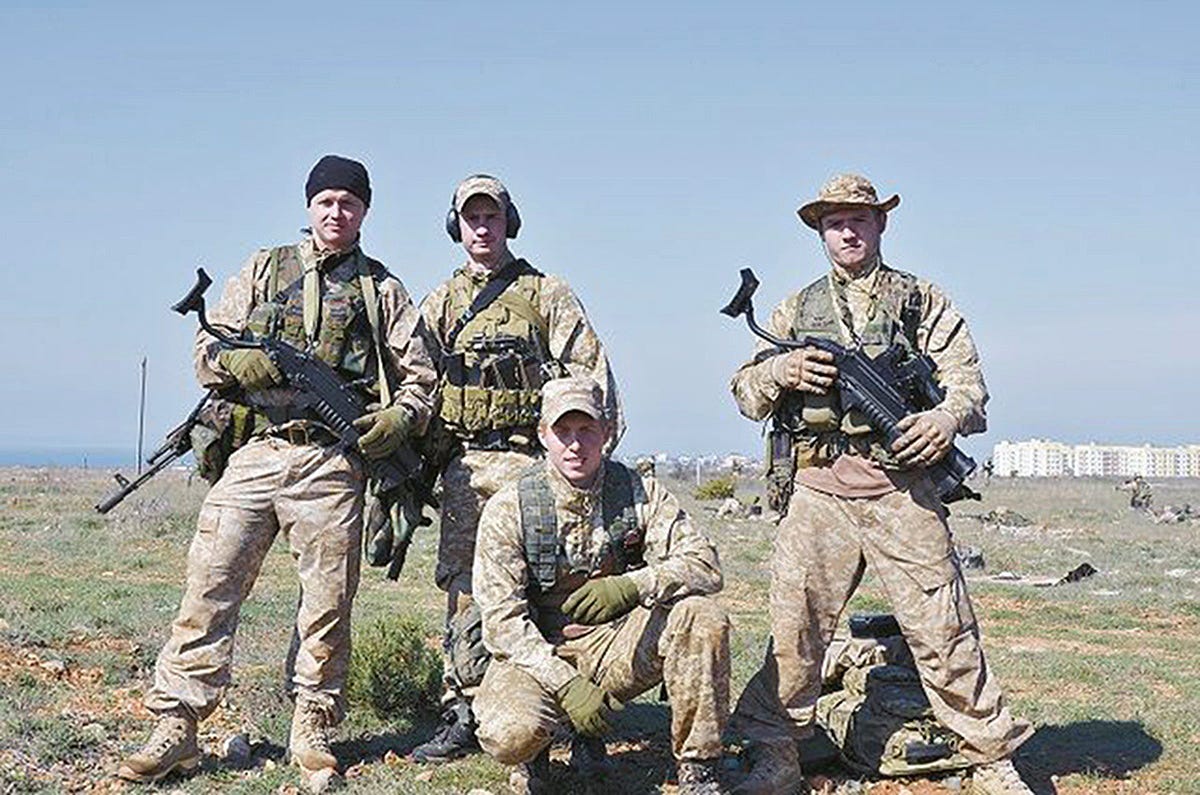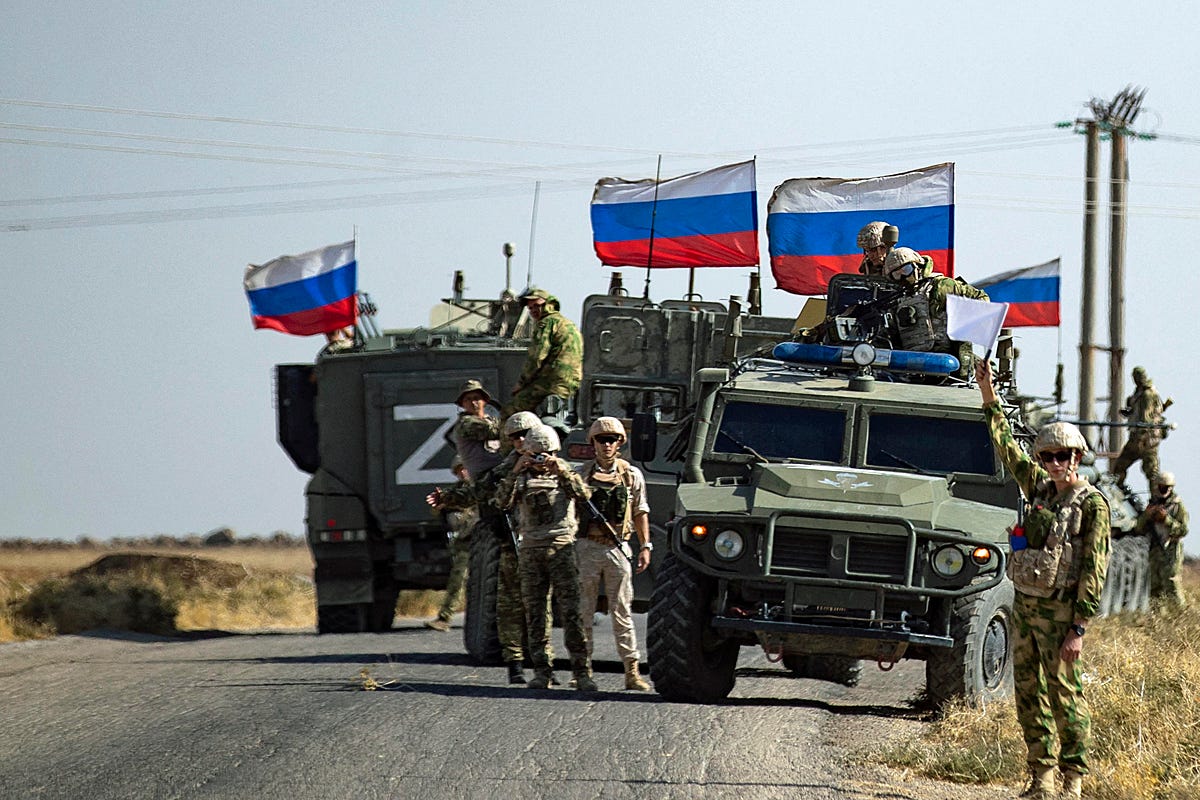The cost of Putin’s military venture in Syria
The BBC can reveal that hundreds of Russia’s most highly-trained military specialists joined their final battle in the Middle East – and will not be returning home.
On a sunny day sometime in 2014, four Russian special forces soldiers posed for a photograph at a military training ground near Sevastopol, in Russian-occupied Crimea. Dressed in combat fatigues, and carrying weapons, all four are smiling at the camera.
Over the next six years the photo would be reposted many times on Russian social media as three of these four elite operatives were killed fighting in Syria.
Captain Fyodor Zhuravlev, standing on the right, died on November 19, 2015, while directing and adjusting airstrikes. Captain Oleg Arkhireyev, squatting at the front, was killed on June 9 the following year, after triggering an explosive device. And Captain 2nd Rank Alexander Tarasyuk, on the left, died on November 13th, 2020. He was said to be on a search and destroy operation against rebel forces, and some reports say he trod on a mine. The fourth figure, whom we have not been able to identify, is presumed to have survived.
Zhuravlev, Arkhireyev and Tarasyuk are just three of the 543 Russian military personnel and members of the ‘Wagner’ mercenary company whose deaths BBC Russian has been able to confirm in Syria between 2015-2024.
The dead include dozens of specialists from elite units — special operations forces, elite FSB troops, GRU military intelligence officers, and military pilots — the true casualty figure is likely far higher.
The proportion of officers and top-level specialists killed, compared to lower ranks and regular troops, has been strikingly high in Syria.
The BBC was able to reveal the total by analysing news reports, social media posts and by data collated from cemeteries and war memorials. Open sources allowed us to establish the names of these men, killed on active duty.
346 of them were Wagner members, some of whose names came to the attention of journalists in a series of leaked documents between 2016-2024.
Russian losses in Syria are inevitably greater than we can establish – the data we are relying upon is almost certainly incomplete. Officially, Russia has acknowledged the deaths of 112 of its servicemen in Syria. But the most recent statement made by the Ministry of Defence dates from the spring of 2019.
Elite special forces losses
The most recent Russian losses in Syria that the BBC has been able to confirm occurred in October this year, with the deaths of Stepan Alektorsky and Nikolai Mikhailenko. Both were officers in marine units. The date they were killed matches that of a publicised ambush by Islamic State militants on a group of senior Syrian officers in desert lands in Deir ez-Zor province.
Local sources reported that two Russian officers had died alongside two Syrian generals during this incident.
As well as to those who loved them, the deaths of Russian soldiers of such seniority will have been a blow to the country’s military as a whole – captains first rank in marine units are the equivalent of colonels in ground forces.
In total, Russia has lost dozens of top-tier specialists in Syria. For instance, open sources confirm the deaths of 15 soldiers and officers from the Special Operations Forces, the crème de la crème of Russia’s elite military personnel.
Two senior officers from the Special Operations Forces, Colonels Igor Meliantsev and Alexander Popov, were among them. Reports said they died of heart conditions.
87% of the deaths we have identified and analysed were either from elite units or were commanding officers in charge of regular military forces.
Russia has also lost at least seven FSB special forces officers in Syria, including members of the "Alpha" group, considered one of the world's top counterterrorism units. Among those killed was Major Sergei Chernyshov, who had a decade’s experience in FSB special forces operations. He died on a special operation in the country on September 22 – but we do not know the exact cause.
“Straight out of college, Sergei left to serve in the North Caucasus with a special forces unit of the FSB border guards. Six years later, in 2012, he was appointed to the Alpha Directorate of the FSB’s Special Operations Centre and trained as a sniper,” wrote Alexei Filatov, another Alpha veteran.
“His training was first class. Sergei was a mountaineering instructor, a gas-rescue specialist, and had completed numerous parachute jumps, including with wing-type chutes."
Chernyshov’s resumé illustrates the vast time, effort and resource invested by Russia in training dozens of elite specialists like him who would go on to lose their lives in Syria.
Evidence can be found in open sources of the deaths in Syria of reconnaissance officers from the highly-regarded 45th Airborne Special Forces Brigade, soldiers and officers of GRU military intelligence units, and more than 20 military pilots and navigators.
The Russian defence ministry itself states that it costs between $3 million and $14 million to train up just a single pilot.
Determining where dead men served is not always possible. Colonel Yevgeny Velev’s demise only became known when his name appeared on a memorial dedicated to reconnaissance soldiers in Kaliningrad.
The Ministry of Defence has not reported his death—or the deaths of many other soldiers and officers. Where in Syria Colonel Velev fought and died remains unknown.
The memorial to war dead in the city of Saratov includes a section dedicated to those who lost their lives in Syria. Engraved on it we found the names of Senior Lieutenant Roman Klyuchnikov and Lieutenant Colonel Vladimir Ivanov. Details of their service record and deaths have never been published.
The breakdown of officers killed in Syria includes one major general, 10 colonels, 15 lieutenant colonels, 31 majors, and 61 officers with ranks from lieutenant to captain. Of the 197 ‘state forces’ we identified as killed, as opposed to dead Wagner irregulars, 118 were officers.
Casualties in the non-commissioned ranks are generally easier to replace. A grenadier or mortar operator can be retrained in a few weeks. Some specialisations may take one or two months. But a dead special forces officer must be swapped for an equivalent specialist – and they are rare by definition.
Training a lieutenant with the necessary qualifications takes at least four years. Then the soldier needs to gain the experience and skills required to carry out special operations missions: another four years. In other words, experts estimate, around eight years in total.
Wagner losses
The Wagner mercenary company suffered the majority of losses in Syria. While defence ministry personnel conducted airborne missions, many of the ‘boots on the ground’ were from the private military outfit. Not only were they deniable, and expendable politically, they were often far better trained and organised than ordinary Russian units.
Wagner was formed in 2014 by Putin’s erstwhile confidant, Yevgeny Prigozhin, who later came to further notoriety for leading a mutiny of his troops from Ukraine in June 2023. He died shortly afterwards, having agreed with Moscow to stand his men down, when the business jet he was travelling in exploded in mid-air.
Yevgeny Alikov had served alongside fighters from the self-declared Lugansk People’s Republic from 2014, before joining Wagner forces in Syria in 2017. His time on deployment to the Middle East lasted just over two months - on September 2, Alikov died near the city of Tiyas in Homs province, after being shot through the abdomen.
His mother Nina knew nothing of this until she was called to come to Rostov on Don in southern Russia to collect his body, along with the paperwork generated by his death. As a Wagner fighter, not a Russian Ministry of Defence employee, Alikov’s killing did not come with monetary compensation.
Wagner men are known to have suffered their first casualties in Syria on October 19, 2015 - before Russian military bases were officially established in the region. Eight operatives were killed on that day alone, according to reporting by the Fontanka publication which gained access to Wagner internal files.

The heaviest Wagner losses were sustained in early 2018, near the Khasham gas fields, whose monetary, if not military value, was self-evident. A convoy with mercenaries aboard some of the vehicles drew close to Kurdish opposition positions – who called in US support. Massive helicopter and artillery strikes followed, and at least 67 Wagner men died on the spot, with another 13 succumbing to their injuries in the days to come.
Overall, 346 Wagner operatives were killed in Syria. Many were experienced veterans from conflicts in the North Caucasus – a far cry from the ex-convicts Prigozhin rounded up from prison colonies for the war in Ukraine.
Read this story in Russian here.
English version edited by Chris Booth.
‘Immoral but effective.’ How the ‘Wagner’ private military company lost 17,000 prisoners in the assault on Bakhmut
BBC Russian continues its investigation into the Kremlin’s war dead in Ukraine.










What the fuck is a private military company if Putin openly admitted that everything was financed from the Russian budget